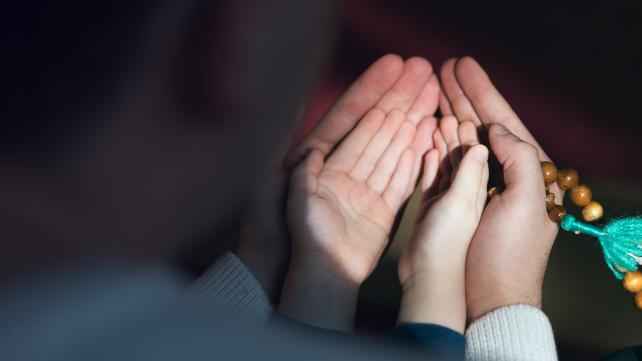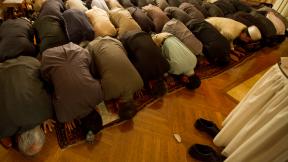
It’s that spiritual time of the year again. Muslims are looking forward to a month of spiritual revival; Masjids are getting ready to welcome the eager worshippers; Imams are rehearsing for daily Quran recitals and religious reminders; organizations are finalizing their programming and fundraising plans, and families are gearing up for a month of bonding, spirituality, and charity.
It’s often assumed that mothers are supposed to plan most of the wonderful activities for their children. So how are fathers supposed to make Ramadan special for their families? What does an engaged father look like in Ramadan? Take kids to Taraweeh prayers? Is that it?
We hardly hear about a father’s role in Ramadan.
One important lesson I learned from the first ‘Pandemic Ramadan’ is that fathers have a crucial role to play, as do mothers, as partners in planning for a Ramadan that is memorable for everyone, insha Allah. Your leadership as a parent both before and during Ramadan will make a positive impact.
1. Call a Family Ramadan Planning Meeting
If you don’t plan for this month of spiritual and moral training, you will waste it. Thirty days will be over before you know it. Take charge of the Ramadan planning now by holding a meeting to brainstorm and discuss ideas for daily and weekly schedules and activities individually and collectively as a family. Depending on the age of your children, ask everyone to think about and develop:
- An “Ibadah” Plan: How many Rakats of Taraweeh will you pray this Ramadan? How many new Duas will you memorize? How much Quran will you read per day? How much of the Quran will you study with understanding? How many new names of Allah will you learn? Set realistic targets for each area based on age and ability.
- A Daily Schedule: What will your day look like? When will you do homework? When will you get physical exercise? When will you prepare for Iftar and Suhoor meals? When will you complete daily Ibadah routines? When will you have your screen time? When will you focus on learning Islam? What will be your sleep routine? What volunteering will you do? What will be your work schedule?
- A Family Activity Plan: What will you do together as a family every day? Iftar? Suhoor? Volunteering? Watching a lecture? Listening to a Tilawah? Entertainment? Board games? Taraweeh? Charity?
2. Prioritize Your Work Schedule to Maximize Family Time
As a father and a husband, your physical presence in the house throughout the month of Ramadan is crucial. Depending on the pandemic lockdown situation in your area and your job protocols, do your best to work from home in Ramadan as much as possible.
If you are already working from home, that’s great. This way you will be able to pray with the family and experience most of Ramadan together. Even if you don’t have the choice to work from home, try to schedule your hours in such a way that your late afternoons, evenings, and nights are free for your family and personal Ibadah. Even better, if you are able to take the last ten days off to observe the special moments of Laylatul Qadr and late night Taraweeh prayers and Qiyams, it will be worth it. Regardless, make sure to announce your work schedule well in advance and ensure all family members do the same to maximize the blessed family time.
3. Plan for Taraweeh Arrangements
One of the biggest challenges, as well as opportunities, that Ramadan under lockdown presents is Taraweeh, the nightly voluntary prayers that are traditionally offered in congregation with long melodic recitations of the Quran. Depending on the pandemic lockdown restrictions in your area, if you are allowed to attend Masjid for Taraweeh prayer with children, make it part of your daily family Ramadan routine.
If the Masjids are not open or partially open to adults only, then organize daily Taraweeh at home. In that case, set up a dedicated “prayer spot” in your home, assign who among your kids will call the Adhan, and plan which parts of the Quran you or your kids will be reciting every night. It is a rare opportunity for every young or old male in the family to memorize, recite, lead, and earn tons of rewards every night. You don’t have to be an Imam or a scholar to organize Taraweeh in the family. But planning for it will make a big difference in how smooth this family spiritual exercise goes.
4. Facilitate a Reflection Time Ten Minutes Before Iftar
Just before Iftar, as you sit together as a family to break your fast, take turns to have every family member mention:
- One thing I am grateful for today
- One Sadaqa (act of charity) I did today (whether monetary or in-kind)
- One reflection from the Quran, a Hadith, or a lecture that struck me today
The daily collective reflection based on every individual family member’s feedback will not only enrich everyone’s spirituality, but also motivate everyone to do better the next day and to outdo each other. End the session with a short collective Dua, as Iftar is a momentous time for supplications to be accepted by Allah. As an engaged father, plan for this daily exercise now to manage expectations and get everyone’s buy-in.
5. Commit to Plan and Prepare Meals Together
If you have not done this before, this Ramadan make a commitment to share the meal planning and cooking with your spouse. As a co-leader in the family along with your wife, your kids need to see you as a role model, which means providing leadership and mentorship in various aspects of family life, including cooking. Follow the beautiful example of our beloved Prophet Muhammad, peace and blessings be upon him, who would enter the house intently looking for domestic chores (“Mihnah”) to help out with.
Regardless of your culinary skills, or the lack thereof, you and your spouse should plan out all the tasks related to Suhoor and Iftar meals ahead of time. Split the tasks between the two of you, and delegate some to the children to boost their Ramadan family spirit. This way, everyone in the family will have a shared experience of Ramadan chores, as well as Ramadan spirituality. Moreover, children will realize that cooking is not just mom’s job, but a shared responsibility where everyone should pitch in.
6. Plan for Daily Family Inspiration and Entertainment Sessions
Just as you plan for collective meal time, reflection time, and spiritual time, you should also have family inspiration and entertainment sessions. Ramadan memories should not be limited to Ibadah, charity, and eating together. You can watch a ten to fifteen-minute lecture series together daily. Every Ramadan, there is a plethora of inspirational virtual lecture series to choose from.
Moreover, you can choose to do a fun family activity together, like playing a board game, or participating in a Ramadan or Islamic Kahoot game as a family, or watching an entertaining show that is Halal and promotes good moral values. Research has shown that it is such beautiful moments of collective family bonding during leisure time that children cherish as they grow older. These are also times where you, as a father, have an opportunity to bond with your boys and girls in ways that you may not have otherwise. So appreciate these fleeting moments this Ramadan.
7. Do a Daily Family Sadaqa Activity
Sadaqa is a beautiful Muslim tradition which is especially amplified in the month of Ramadan, when we give Sadaqa together as a family.
Firstly, Sadaqa is not just limited to financial donations only. As we know, “Smiling in your brother’s face is a Sadaqa,” advised our Prophet, peace be upon him (Tirmidhi).
Secondly, Ramadan provides us a special 30-day program of practicing Sadaqa because Shaytan is locked away. The donation appeals and opportunities to connect with and serve people are limitless.
Thirdly, as a family we have multiple hands, feet, and pockets collectively multiplying our motivation and potential for Sadaqa.
As a father, consult your family members and develop and lead the “Family Sadaqa Action Plan”, which could include acts of Sadaqa that either members of the family do together, or one or two family members execute on behalf of the family.
Depending on the opportunities that come your way daily or weekly in Ramadan, some Sadaqa actions can be collective family activities and others can be done by individuals. Make sure someone provides a daily Sadaqa update at Iftar time. Some ideas, to be executed based on COVID-19 safety protocols, may include:
- Cooking food for someone sick
- Dropping off food to someone sick
- Shopping for Ramadan and/or Eid gifts
- Distributing Ramadan and/or Eid gifts
- Donating $5 to $10 to the same charity or a different one every day online
- Creating a thank you card for a frontline worker in your community.
- Calling a lonely or an elderly person to check up on them
- Distributing Iftar meals to loved ones
- Doing groceries for seniors, those with have special needs, the sick, or single parents
- Volunteering at a local food bank
- Volunteering at a local soup kitchen
- Paying it forward at a coffee shop drive-thru
- Organizing a drive-thru Iftar party with packaged food for distribution
- Organizing a crowdfunding campaign for a cause
- Making a phone call or writing an email to an elected official to advocate for a human rights issue
- Any other idea your family members can think of. Sky's the limit….
As a concerned father, you have plenty of opportunities to engage and inspire your family members to experience a Ramadan that is productive and memorable as a family.








Add new comment